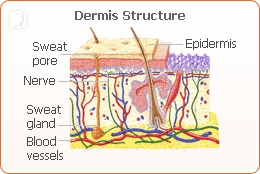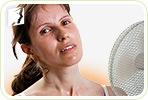Hot flushes, also known as hot flashes, are an unpleasant symptom of menopause. Women who experience hot flushes can find themselves suddenly overheated for no apparent reason. During a hot flush, they may become clammy, have an increased heart rate, have a flushed face, and sweat excessively. Although menopausal hot flushes are not usually a sign of ill health, they can be very embarrassing and uncomfortable. Women experience hot flushes to different degrees; some will barely notice their hot flushes while others are unable to continue daily life during them. However, there are many ways for menopausal women to prevent hot flushes from occurring.
Why Do Menopausal Women Experience Hot Flushes?

The exact cause of hot flushes is undetermined. However, doctors do know that hot flushes during menopause are often a result of changing hormone levels. A decrease in estrogen and progesterone affects the functions of body and can cause a woman's body to become too hot. Hot flushes occur when the blood vessels near the surface of the skin dilate to allow the body to cool down. Consequently, a woman may have an increased heart rate, a flushed appearance, sweat excessively, and feel uncomfortable.
How Long Do Hot flushes Last?

A hot flash episode varies greatly between women. Each experience can last between 30 seconds to five minutes. Further, for some menopausal women, hot flushes only occur for a very short period during their menopausal stage. Other women continue to have hot flushes well into their postmenopausal years. However, menopausal women suffering from severe hot flushes should not worry. There are many treatments available to help women combat their hot flushes.
Keep it simple:
If you're exercising or being active and notice your heart accelerating, stop what you are doing and rest. A rapid heart rate is a strong indication that your body needs a break.
Are There Treatments for Hot flushes?
Menopausal women who are suffering from mild or severe hot flushes, should attempt to make lifestyle changes before beginning any hormonal treatment. Try to eliminate or avoid the following lifestyle choices that can increase the severity of hot flushes.
- Consuming excessive amounts of alcohol and caffeine
- Smoking
- Wearing tight or heavy clothing
- Eating spicy foods
- Avoiding stress
There are several natural remedies that can help reduce the intensity of hot flushes or prevent them all together. These include:

Slow, deep breathing techniques can help lessen the number and frequency of hot flushes.
Women who attend Pilates and Yoga classes can learn how to effectively breathe through their abdomen.
Taking vitamin E and B complex has been shown to reduce the severity of hot flushes.
Herbal supplements such as Macafem or black cohosh have also been shown to diminish the effects of hot flushes.
Many menopausal women report that a combination of alternative treatments and lifestyle changes often helps to lessen the occurrences of hot flushes. However, if these are not effective, prescribed medications available include:
- Hormone replacement therapy (HRT)
- Anti-depressants
There are other medications available to help women with their hot flushes.
Sources
- Sikon, Andrea and Holly Thacker M.D. "Treatment for Menopausal Hot Flashes". Cleveland Clinic Journal of Medicine. July 2004: 71 (7).
- "Hot flashes ... in January". Canadian Medical Association Journal. 2004: 170 (1).
- Miller, Heather and Rose Maria Li, M.D. "Measuring Hot Flashes: Summary of a National Institutes of Health Workshop". Conference report. Mayo Clinic. June 2004: 79.



